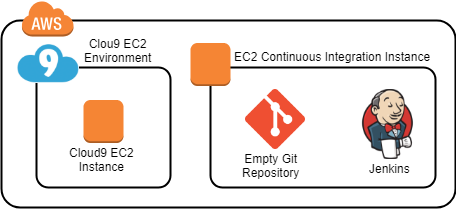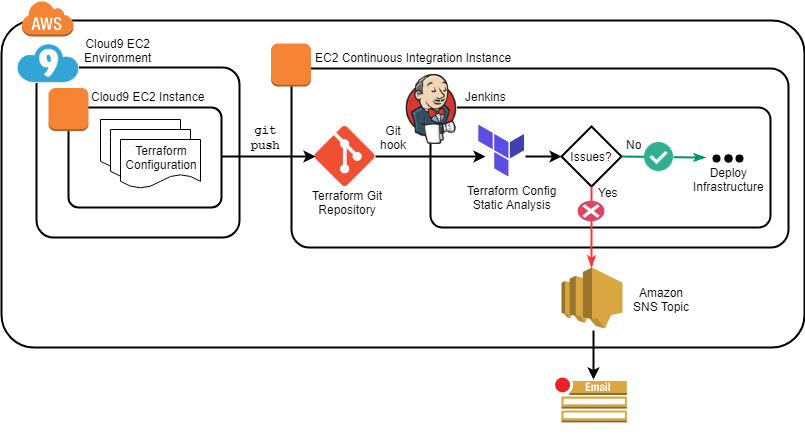Static Analysis and Alerting for Infrastructure as Code
A key practice in DevOps is to manage Infrastructure as Code (IaC) allowing repeatable deployments across environments. Having IaC brings the benefits of static code analysis tools to infrastructure. Static analysis tools can automatically detect issues in your infrastructure, including security gaps, before you ever deploy the infrastructure. This Lab will illustrate static analysis and alerting for IaC, using Terraform as an example IaC framework. You will use static analysis tools to analyze Terraform configurations and automate the process in a continuous integration pipeline using a Git repository, Jenkins automation server, and Amazon Simple Notification Service (SNS).
Lab Objectives
Upon completion of this Lab, you will be able to:
- Explain the benefits of static analysis for IaC
- Understand how to automate the use of static analysis tools
- Configure automated static analysis of IaC in a continuous integration pipeline in Jenkins
- Configure automated alerting of static analysis issues using Jenkins and Amazon SNS
Lab Prerequisites
You should be familiar with:
- IaC concepts and at least one IaC tool
- Compute and Network concepts in AWS or other public clouds
- Amazon SNS basics are useful but not required
- Basic Docker concepts and command knowledge are useful but not required
Lab Environment
Before completing the Lab instructions, the environment will look as follows:

After completing the Lab instructions, the environment should look similar to:

Updates
April 17th, 2024 - Resolved Terrascan issues
January 24th, 2024 - Updated screenshots & instructions to reflect the latest UI
November 15th, 2023 - Resolved an issue that caused the lab to fail to provision on rare occasions
August 3rd, 2023 - Added login to Jenkins server
January 7th, 2022 - Updated Jenkins version
October 8th, 2021 - Resolved an issue causing Jenkins to be unavailable
May 18th, 2021 - Resolved an issue that caused the Jenkins server to fail to properly configure in some instances
November 8th, 2020 - Updated Jenkins version and added a custom validation check
August 1st, 2020 - Updated Jenkins signing keys
April 25th, 2019 - Updated Jenkins version and resolved issue causing the prior version to be very slow to start
January 10th, 2019 - Added a validation Lab Step to check the work you perform in the Lab
September 6th, 2018 - Resolved an issue with the Jenkins SNS Notifier not emailing the correct build url (${BUILD_URL})
Logan has been involved in software development and research since 2007 and has been in the cloud since 2012. He is an AWS Certified DevOps Engineer - Professional, AWS Certified Solutions Architect - Professional, Microsoft Certified Azure Solutions Architect Expert, MCSE: Cloud Platform and Infrastructure, Google Cloud Certified Associate Cloud Engineer, Certified Kubernetes Security Specialist (CKS), Certified Kubernetes Administrator (CKA), Certified Kubernetes Application Developer (CKAD), and Certified OpenStack Administrator (COA). He earned his Ph.D. studying design automation and enjoys all things tech.